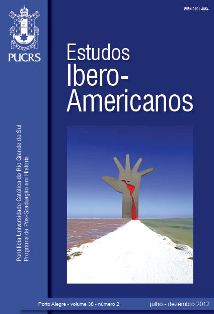Racist speech in Chile and Peru during the Pacific War (1879-1884)
DOI:
https://doi.org/10.15448/1980-864X.2012.2.13113Abstract
War is a transcendent moment in the history of nations. This article examines the subjective perceptions that define the moral reality of war. To this effect, it focuses on the belligerent discourse used in Chile and Peru during the War of the Pacific. These are considered cultural artifacts that furnished meaning to the conflict itself. The hypothesis posits the existence of a racist discourse predicated upon the historical and ideological realities of the time. The speeches underscore the images of the Chilean ‘roto’ and the Peruvian ‘cholo’, which constitute national icons used to homogenize and exacerbate key qualities of the peoples in conflict. This study draws upon an analytical approach that studies political discourse and focuses on the context within which it was formulated and reformulated. The article draws upon newspapers and the political proclamations of the period as the primary source material.Downloads
Downloads
Published
How to Cite
Issue
Section
License
Copyright
The submission of originals to Estudos Ibero-Americanos implies the transfer by the authors of the right for publication. Authors retain copyright and grant the journal right of first publication. If the authors wish to include the same data into another publication, they must cite Estudos Ibero-Americanos as the site of original publication.
Creative Commons License
Except where otherwise specified, material published in this journal is licensed under a Creative Commons Attribution 4.0 International license, which allows unrestricted use, distribution and reproduction in any medium, provided the original publication is correctly cited.






